Serious Games
Any activity seems to go without effort when you’re doing something you like and that gives you fun. Games encompass fun. As a result the hypothesis arises that using games for learning should make learning fun and thus make it easier. Nowadays, the most widespread, influential, and profitable game formats are computer games (Squire, 2003).
Access this chapter
Tax calculation will be finalised at checkout
Purchases are for personal use only
Preview
Unable to display preview. Download preview PDF.
References
Alfieri, L., Brooks, P.J., Aldrich, N.J., Tenenbaum, H.R.: Does discovery-based instruction enhance learning? Journal of Educational Psychology 103, 1–18 (2010), doi:10.1037/a0021017
Clark, R.C., Mayer, R.E.: E-learning and the science of instruction: Proven guidelines for consumers and designers of multimedia learning. Pfeiffer, San Francisco (2011)
De Jong, T., Van Joolingen, W.R.: Scientific discovery learning with computer simulations of conceptual domains. Review of Educational Research 68, 179–201 (1998), doi:10.3102/00346543068002179
Eysink, T.H.S., De Jong, T.: Does instructional approach matter? How elaboration plays a crucial role in multimedia learning. Journal of the Learning Sciences, 1–43 (in press), doi: 10.1080/10508406.2011.611776
Gentile, D.: Pathological video-game use among youth ages 8 to 18. Psychological Science 20, 594–602 (2009), doi:10.1111/j.1467-9280.2009.02340.x
Habgood, M.P.J., Ainsworth, S.E.: Motivating children to learn effectively: exploring the value of intrinsic integration in educational games. Journal of the Learning Sciences 20, 169–206 (2011), doi:10.1080/10508406.2010
Johnson, C.I., Mayer, R.E.: Applying the self-explanation principle to multimedia learning in a computer-based game-like environment. Computers in Human Behavior 26, 1246–1252 (2010), doi:10.1016/j.chb.2010.03.025
Kebritchi, M., Hirumi, A.: Examining the pedagogical foundations of modern educational computer games. Computers & Education 51, 1729–1743 (2008), doi:10.1016/j.compedu.2008.05.004
Kebritchi, M., Hirumi, A., Bai, H.: The effects of modern mathematics computer games on mathematics achievement and class motivation. Computers & Education 55, 427–443 (2010), doi: 0.1016/j.compedu.2010.02.007
Kiili, K.: Digital game-based learning: Towards an experiential gaming model. The Internet and Higher Education 8, 13–24 (2005), doi:10.1016/j.iheduc.2004.12.001
Kuhn, D., Dean, D.: Is developing scientific thinking all about learning to control variables? Psychological Science 16, 866–870 (2005), doi: 10.1111/j.1467-9280.2005.01628.x
Leemkuil, H., De Jong, A.J.M.: Instructional support in games. In: Tobias, S., Fletcher, J.D. (eds.) Computer Games and Instruction, pp. 353–369. IAP inc., Scottsdale (2011)
Leemkuil, H., De Jong, A.J.M.: Adaptive advice in learning with a computer based strategy game. Academy of Management Learning and Education (in press)
Mayer, R.E.: Should there be a three-strikes rule against pure discovery learning? American Psychologist 59, 14–19 (2004), doi: 10.1037/0003-066X.59.1.14
Paras, B., Bizzocchi, J.: Game, motivation, and effective learning: An integrated model for educational game design. Paper Presented at the Proceedings of DiGRA, Conference: Changing Views – Worlds in Play (2005)
Reid, D.J., Zhang, J., Chen, Q.: Supporting scientific discovery learning in a simulation environment. Journal of Computer Assisted Learning 19, 9–20 (2003), doi:10.1046/j.0266-4909.2003.00002.x
Ryan, R.M., Rigby, C.S., Przybylski, A.: The motivational pull of video games: A self-determination theory approach. Motivation and Emotion 30, 344–360 (2006), doi:10.1007/s11031-006-9051-8
Skadberg, Y.X., Kimmel, J.R.: Visitors’ flow experience while browsing a web site: its measurement, contributing factors and consequences. Computers in Human Behavior 20, 403–422 (2004), doi:10.1016/s0747-5632(03)00050-5
Squire, K.: Video games in education. International Journal of Intelligent Games and Simulation 2, 49–62 (2003), retrieved from http://www.scit.wlv.ac.uk/~cm1822/ijkurt.pdf
Squire, K.: Changing the game: What happens when video games enter the classroom. Innovate: Journal of Online Education, 1, 20 (2005), retrieved from http://www.innovateonline.info/pdf/vol1_issue6/Changing_the_Game-__What_Happens_When_Video_Games_Enter_the_Classroom_.pdf
Susi, T., Johannesson, M., Backlund, P.: Serious games - An overview. Skövde: University of Skövde (Technical Report HS-IKI-TR-07-001), 1–28 (2007)
Sweetser, P., Wyeth, P.: GameFlow: a model for evaluating player enjoyment in games. Computers & Entertainment 3, 3–24 (2005), doi:10.1145/1077246.1077253
Tobias, S., Fletcher, J.D.: Computer games and instruction. IAP inc, Scottsdale (2011)
Vandercruysse, S., Vandewaetere, M., Clarebout, G.: Game-based learning: A review on the effectiveness of educational games. In: Cruz-Cunha, M.M. (ed.) Handbook of Research on Serious Games as Educational, Business and Research Tools: Development and Design. IGI Global, Hershey (in press)
Vogel, J.J., Vogel, D.S., Cannon-Bowers, J., Bowers, C.A., Muse, K., Wright, M.: Computer gaming and interactive simulations for learning: A meta-analysis. Journal of Educational Computing Research 34, 229–243 (2006)
Wouters, P., Van der Spek, E.D., Van Oostendorp, H.: Current practices in serious game research: a review from a learning outcomes perspective. In: Connolly, T.M., Stansfield, M., Boyle, L. (eds.) Games-based Learning Advancements for Multisensory Human Computer Interfaces: Techniques and Effective Practices, pp. 232–255. IGI Global, Hershey (2009)
Wu, W., Hsiao, H., Wu, P., Lin, C., Huang, S.: Investigating the learning-theory foundations of game-based learning: a meta-analysis. Journal of Computer Assisted Learning (2012), doi: 10.1111/j.1365-2729.2011.00437.x
Author information
Authors and Affiliations
Editor information
Editors and Affiliations
Rights and permissions
Copyright information
© 2012 Springer-Verlag Berlin Heidelberg
About this paper
Cite this paper
ter Vrugte, J., de Jong, T. (2012). How to Adapt Games for Learning: The Potential Role of Instructional Support. In: De Wannemacker, S., Vandercruysse, S., Clarebout, G. (eds) Serious Games: The Challenge. ITEC/CIP/T 2011. Communications in Computer and Information Science, vol 280. Springer, Berlin, Heidelberg. https://doi.org/10.1007/978-3-642-33814-4_1
Download citation
DOI: https://doi.org/10.1007/978-3-642-33814-4_1
Publisher Name: Springer, Berlin, Heidelberg
Print ISBN: 978-3-642-33813-7
Online ISBN: 978-3-642-33814-4
eBook Packages: Computer ScienceComputer Science (R0)

